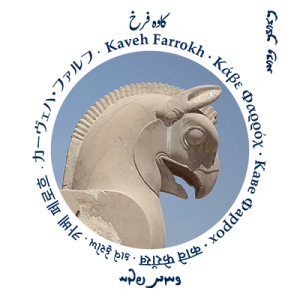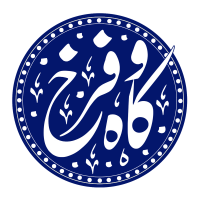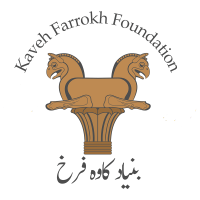The article “Saving Another Dying Jewish Language Before It’s Too Late” written by Shany Littman was first published in Haaretz on April 19, 2010. The version below has been slightly edited. Note that the images and accompanying captions that appear in the version printed below do not appear in the original Haaretz report.
Note that the title is somewhat incomplete as the language it is citing, Juhuri, is in practice a mixed Hebrew and Iranian language. As acknowledged in the article below:
Juhuri, which belongs to the family of Iranian tongues, was the language of the Jews who live in the eastern Caucasus Mountains, an ethnic group whose members were also known as “Mountain Jews.’
=====================================================================================
Juhuri-speaking descendants of Mountain Jews from the Eastern Caucasus are documenting and preserving the rich legacy of their language
At 6 P.M. Zina Razilov finishes work at a supermarket in Hadera. Still wearing her cashier’s uniform, she rushes to the basement of a building on one of the town’s main streets for a rehearsal in the theater where she performs. The Theater of the Eastern Caucasus, as it is officially called, is the only theater in the world that stages plays in the Juhuri language.
Slightly late, thus arousing the anger of theater director and manager Roman Izayev, she joins the musical director, Shamai Abdalimov, and the other actors. They are all seated around a table covered with newspaper clippings in Russian, drinking tea and waiting for the rehearsal to start. During the day, the actors work hard for a living, and three evenings a week they participate in rehearsals, without pay. The most veteran among them is Bikal Matatov, who was a member of the theater company in her hometown, Derbent, in Russia’s Dagestan Republic.
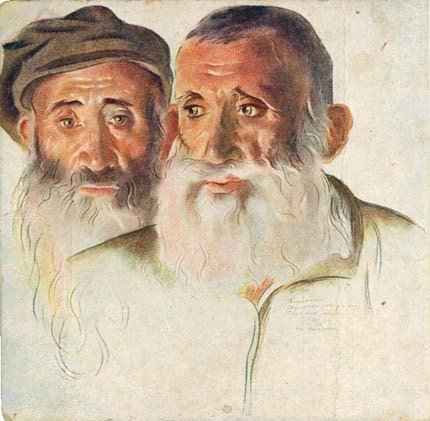
A painting of Iranian speaking Jews of the Eastern and Northern Caucasus, also known as “Mountain Jews” (Photo Source: The Goldstein-Goren Diaspora Research Center).
At the start of the rehearsal, the actors gather around Abdalimov’s piano and sing in a language similar to Persian, but with softer sounds, as well as the addition of gutturals like ayin and het and a vowel sound reminiscent of the French eu.
Established in 1923 in Derbent, the theater has been operating in Israel since 2001. Roman Izayev, its unquestioned leader, joined the theater in 1961. Razilov, 37, who immigrated to Israel 10 years ago, belongs to the younger generation of actors. As a child she didn’t speak Juhuri because she grew up in a boarding school. Only when she returned to her parents’ home at age 14 did she make initial attempts to speak the language. Her mother told her she should keep quiet, because she “spoke strangely.”
Juhuri, which belongs to the family of Iranian tongues, was the language of the Jews who live in the eastern Caucasus Mountains, an ethnic group whose members were also known as “Mountain Jews.’ For years the Jews of the Caucasus lived as a minority in the northern part of Azerbaijan and in Dagestan. In that region there is a larger population of Muslims of Persian origin, who speak a similar language, called Tat. That is why linguists call Juhuri “Judeo-Tat.”
According to a tradition prevalent in the community, the Jews of the Caucasus are descendants of tribes exiled from the Kingdom of Judea after the Babylonian king Nebuchadnezzar destroyed the First Temple. They settled in Persia, where they acquired one of the dialects of Persian, at the same time preserving a considerable vocabulary of Hebrew words. When the Persian rulers wished to strengthen the northern borders of the empire, they resettled these Jewish tribes in the Caucasus.
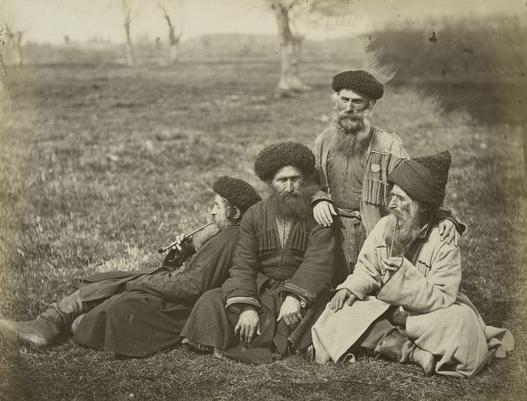
Undated photo (late 19th or early 20th century?) Mountain Jews of the Caucasus conversing and resting (Source: Public Domain). The “Mountain Jews” above are actually the descendants of the Jews of Iran whose origins in that land go back to the pre-Islamic era. Their language is Juhuri which is a Persian-based dialect mixed with Hebrew. Note that these Jews are distinct from the mainly Georgian Jews of the Caucasus being discussed in this article. The Juhuri-speaking Jews are mainly located in the modern-day Republic of Azerbaijan (known as Arran and the Khanates until May 1918) as well as Daghestan.
Until the 20th century, Juhuri was used mainly as the everyday spoken language. Hebrew was the community’s principal written language, and was also the language of prayer and study, with almost all Jewish men in the Caucasus learning to read and write it from an early age. When the members of the community began using Juhuri as a written language, they used Hebrew letters similar to Rashi script (a semi-cursive typeface for Hebrew used by early typographers). The first two books printed in Juhuri in Hebrew script – a prayer book and a book about Zionism – were published in 1908 and 1909, respectively. The Jews managed to preserve their unique language for hundreds of years, until the Russians arrived in the Caucasus.
In the mid-19th century, Russia annexed the region, and the Russian language began to spread in the Caucasus. As education became more secular, the Jews developed commercial ties with the Russian community, and many of them moved from rural areas to the cities, which were populated by Russians. But only after the communist revolution did the mass transition from Juhuri to Russian begin.
Saving Juhuri
In 1929, following the Russification efforts of the communist government and its attempts to suppress any trace of religion, speakers of Juhuri stopped writing in Hebrew letters and began using the Latin alphabet. Ten years later they began to write the language in Cyrillic letters. This transition made reading the language very difficult, because the Cyrillic alphabet did not suit the unique sound system of Juhuri.
Why is it that after hundreds of years, during which the Mountain Jews managed to preserve their unique language in a multilingual environment, it has almost disappeared over the course of a few decades in the 20th century?
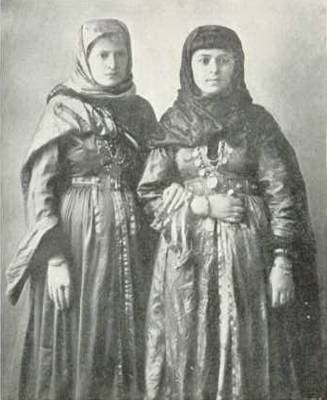
Jewish girls from the Caucasus in 1913 (Photo Source: Public Domain).
Vitaly Shalem, a native of Pyatigorsk in the Caucasus, who immigrated to Israel in 1992, is so preoccupied by this question that he decided to write a master’s thesis on it in the linguistics department of Tel Aviv University. Shalem, 36, belongs to the generation whose mother tongue was Russian rather than Juhuri:
“My parents didn’t speak Juhuri to me, although they did speak it between themselves … The little I knew I learned from my grandmother.”
Shalem examines the sociolinguistic aspect of the language and tries to document its history from the pre-Revolutionary period to the present:
“In my thesis, I ask whether the language is really in danger of extinction. My answer is yes, although not at the moment. My guess is that in about 40 years it will be extinct. Experts tend to blame the Soviet government and its enforced policy of Russification for the extinction of the language. But the linguistic policy of the Soviet government is only part of the issue. The more important reason for the decline of Juhuri was apparently sociological.
“Beginning in the 19th century, the prestige of the Russian language increased steadily, and fluency in it was considered a path to success. The Mountain Jews found themselves in an uncomfortable situation. Although they gave the Russians a friendly welcome, certainly compared to other communities in the Caucasus, the attitude of the Russian government toward them was not significantly different than its attitude toward the other inhabitants of the region. The Russians considered the Jews, like the other Caucasian communities, uneducated, inferior and lacking professions.
“The main reason for this attitude was the Mountain Jews’ ignorance of Russian. Even the Ashkenazi Jews in Russia [Jews of European origin] looked down on them. The key to success in the new world in which they found themselves was the ability to speak Russian without a trace of a foreign accent. Knowledge of Juhuri was considered an obstacle that was liable to prevent the people of the Caucasus from speaking perfect Russian. The attitude of the speakers toward their language changed, and they even stopped speaking to their children in Juhuri.”
At present there are about 100,000 Caucasian Jews living in Israel, most of them in Acre, Haifa, Be?er Sheva, Hadera, Or Akiva, Netanya, Ashdod and Ashkelon. Members of the community came to Israel in two large waves of aliyah in the 1970s and then, after the disintegration of the Soviet Union, in the 1990s. They maintain close ties among themselves and continue to nurture their culture in the Juhuri language. Aside from songs, literary writing and dance troupes, the cultural activity of the Caucasian community includes Roman Izayev’s itinerant theater, which performs humorous musical plays in the various population centers of the community. These are received with great enthusiasm.
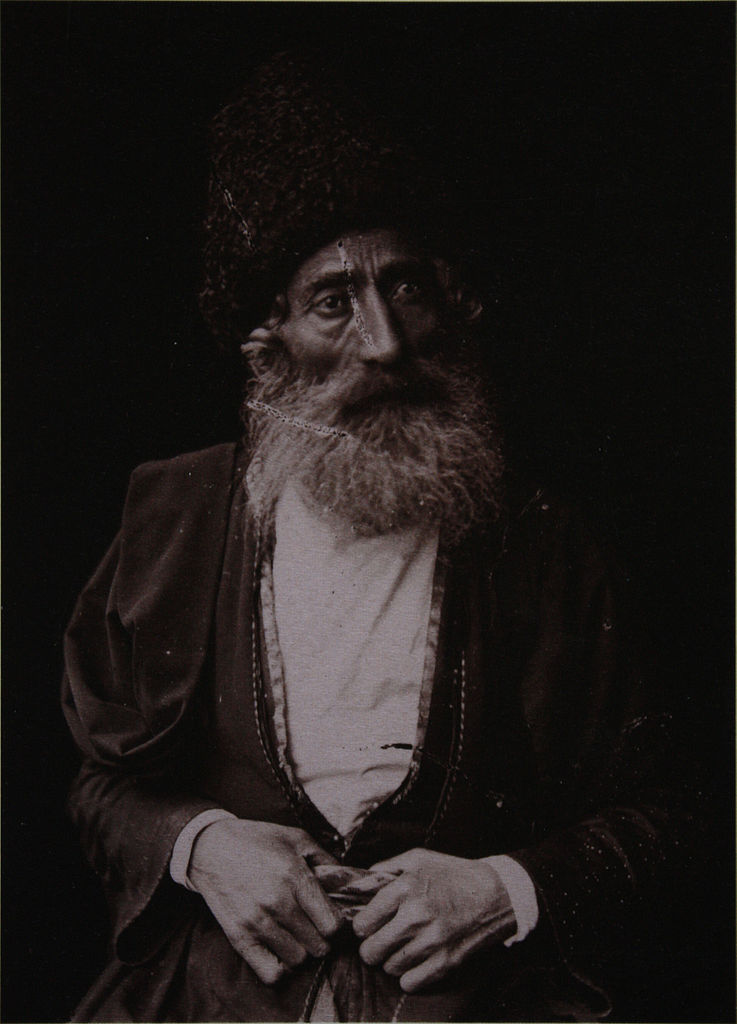
Late 19th century photo of a Jewish man from the Southern Georgian Akhaltsikhe region (Photo Source: Poemas del Rio Wang).
According to the actors, the halls where the plays are performed are usually full to capacity. The plays are based on those of Hizghil (Yehezkel) Avshalumov, a Mountain Jew and a popular author in the first half of the 20th century, who wrote in Juhuri, describing the lifestyle of the Jews of the Caucasus. In addition, they perform plays that concern their lives in Israel, through which they deal with prejudices and stigmas about the community, and with the challenge of integrating into Israeli society.
Despite the difficulty of maintaining a theater with a minimal budget (and a small amount of support from the Immigrant Absorption Ministry), and conducting rehearsals amid job and family commitments, the actors feel they are playing an important part in preserving their cultural heritage.
Razilov, a mother of three, leaves her children with their grandmother when she attends rehearsals. “In the 10 years since the theater was established, there were many young women who came to work with us and left after they got married because their husbands didn’t allow them to come,” she says. “When I got married, I presented an ultimatum to my husband: I said that if he didn’t allow me to continue in the theater, I wouldn’t get married. He didn’t agree, and there were many problems with the family on this issue, but in the end it worked out.”
Poet and Writer
Boris Hanukayev is a familiar figure in Israel’s Caucasian community. He was born in 1952 in Derbent, one of the major concentrations of Jews in the Caucasus, and immigrated to Israel in 1991 with his wife and two children. Today he lives in Or Akiva.
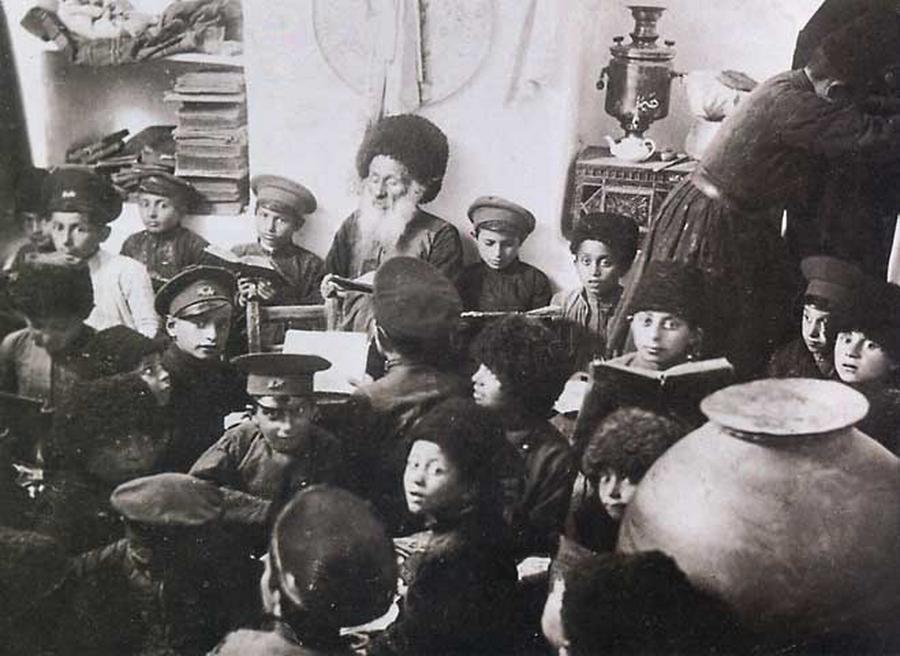
A 1920s photo of a Jewish school in Quba in modern-day Republic of Azerbaijan (known as Arran and the Khanates until 1918) (Photo Source: Public Domain). Quba continues to feature a large Jewish population and is considered to be among the largest Jewish communities of the former Soviet Union.
A social worker by profession, Hanukayev is employed by the Immigrant Absorption Ministry as an adviser on the absorption of the immigrants from the Caucasus. But in the community he is known mainly as a poet and a writer. As noted by Hanukayev:
“When I was a child, we spoke only Juhuri at home … I learned Russian only in school. The Jews were then about one-third of the population of Derbent. Today, after the major aliyah of the 1990s, only about 2,000 Jews are left in the city [whose population is over 100,000]. When I was in seventh grade I began to write poems and stories. At first I wrote in Russian, but in the mid-1970s one of the musicians of our community, David Ossipov, turned to me and suggested that I write words to a melody of his. I wrote a poem in Juhuri that is called ‘The Guests of Derbent,’ which quickly became famous. In Israel, singer Sergei Eliasapov put out a disc composed entirely of my songs, and when there are bar mitzvah parties, weddings, brit milah [circumcision] parties, they sing the songs.”
Hanukayev also publishes poems in a literary magazine that comes out in Israel once a year and includes poetry and prose in Russian, Juhuri and Azeri. Recently he began to write poems in Hebrew as well. One of his poems in Juhuri says:
Rafte ruzho heme furmush ne biret. Ommo ae diul lap kguvotlu ne mundet Zunde bire teher Feniks omorem Ae merekem tovushe rang dekurdem
“What was remains in my memory as a witness. But the feelings of that time are not strong now. Like a phoenix I was burned and came back to life, I blessed the hardship and the happiness like two equals.”
A Disappearing World
Until World War II, there were schools in the Caucasus region where the language of instruction was Juhuri. During the war, teaching in those schools ceased. It was renewed only in 1988, after Hanukayev established a Jewish cultural center in Derbent and convinced the government to resume Juhuri lessons in the schools. His two children, who were raised from childhood to speak Russian and did not know Juhuri, were among the first students.
Hanukayev says that during his childhood there was a very rich cultural life in Derbent conducted in Juhuri, even under the communist regime. He states:
“There were kolkhozes [collective farms] where almost the entire population was Jewish. They had theaters and musical troupes that performed in Juhuri … These plays were usually related to Persian folklore, because for the Jews, the high culture was Persian and Azeri, not Hebrew. We were not familiar with [Hebrew poets Haim Nahman] Bialik and [Shaul] Tchernikovsky. The authors we read were Yono (Yona) Semyonov, whose language was very rich and peppered with Hebrew words and expressions borrowed from the holy tongue, Mishi (Moshe) Bakhshiyev, who wrote prose and poetry, Hizghil (Yehezkel) Avshalumov, who wrote prose and satirical and humorous plays, Sergei Yezgayev, a poet and a philosopher, and Danil Atnilov, who was a poet with a surprising and subversive vision.”
He estimates that there are only about 50,000 Juhuri speakers living in Israel, born before the 1970s. Most, he says, do not speak Juhuri to their children:
“In Israel, when you ask the students in school what their mother tongue is, they say Russian. Nobody says Juhuri any more.”
Vitaly Shalem points out that the only place in the world where you can still find young children who speak Juhuri among themselves – in other words, a place where the language is still alive and well – is the city of Kuba in northern Azerbaijan, which has the largest concentration in the Caucasus of Mountain Jews, numbering several thousand.
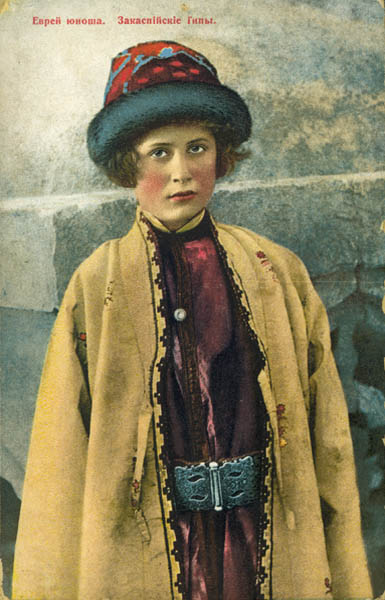
Image of a Bukhara Jew in Central Asia at the turn of the 19th century. The Jews of Bukhara are located in not just in the city of Bukhara but also in other cities of Uzbekistan in Central Asia. Bukhara Jews speak a Jewish vernacular of the Samarkand-Bukhara dialect of the Perso-Tajik language (Photo Source: The Goldstein-Goren Diaspora Research Center).
Shalem also admits that his need to research the language stems from a feeling that it represents a disappearing world:
“There’s a feeling of missing out, that I don’t properly know the language that was part of the culture of my community and part of our collective identity in a multinational and multilingual region. Of course there’s a certain sense of nostalgia, a longing for Grandma’s voice speaking to me in this language, and me trying to mimic her in a childish way. I have a need at least to document Juhuri before it’s too late.”
Video posted by the Endangered Language Alliance [ELA] of Juhuri instructor Simon Mardkhayev. Speaking in Juhuri (A Persian-based dialect mixed with Hebrew), Mardkhayev is telling a story of hope from his childhood, in the Juhuri language spoken by the Jews of the Republic of Azerbaijan (known as Arran and the Khanates until May 1918) and Daghestan. Recorded at ELA on January 12, 2016.
The Juhuri theater plays attract people from every age group, even young people who barely understand the language. Even the children of actress Zina Razilov don’t speak Juhuri:
“At first I spoke Russian, Juhuri and Hebrew to them. But they get confused and have problems with learning Hebrew, so I decided to stop trying to teach them Juhuri. It’s better if they first know Hebrew properly.”

